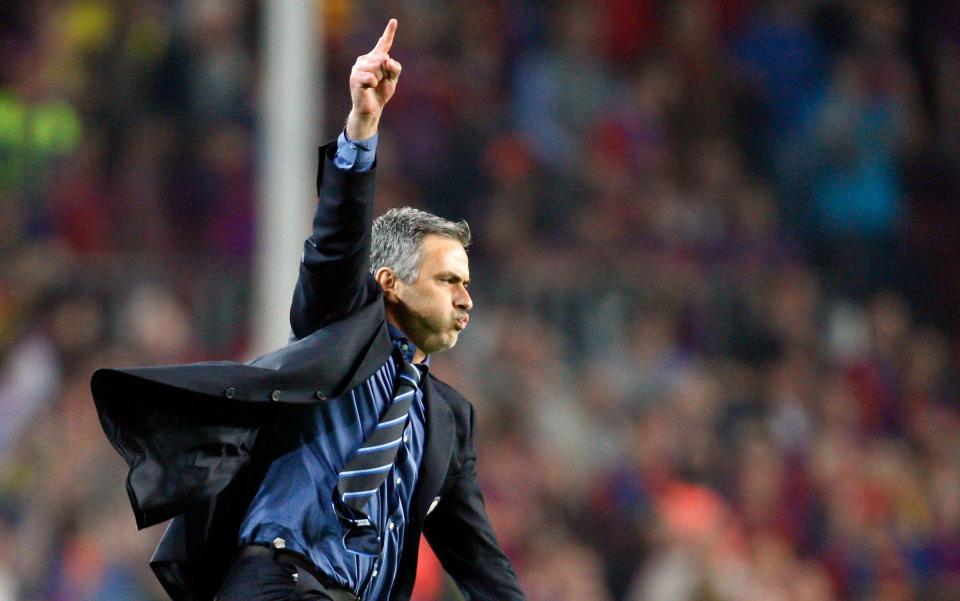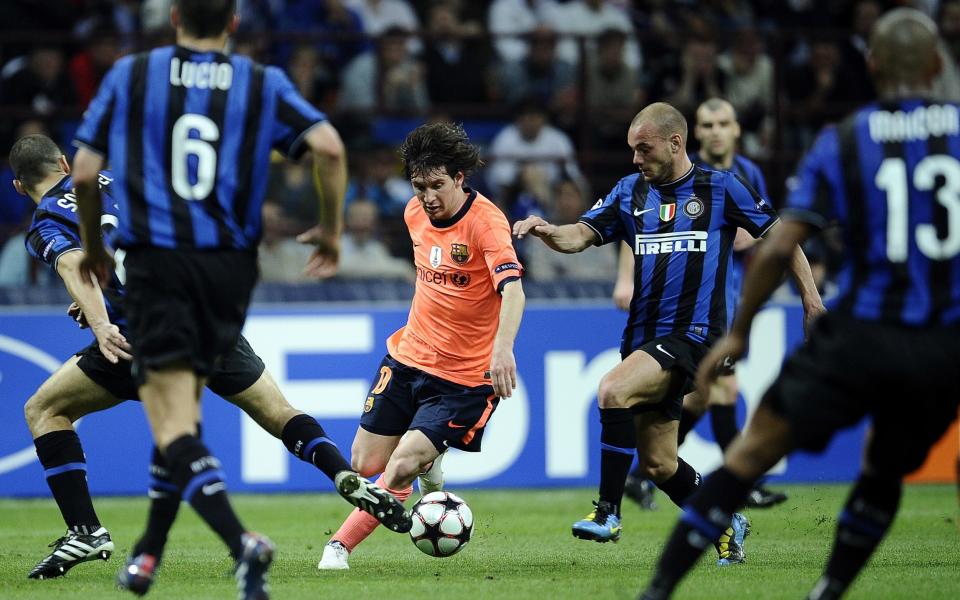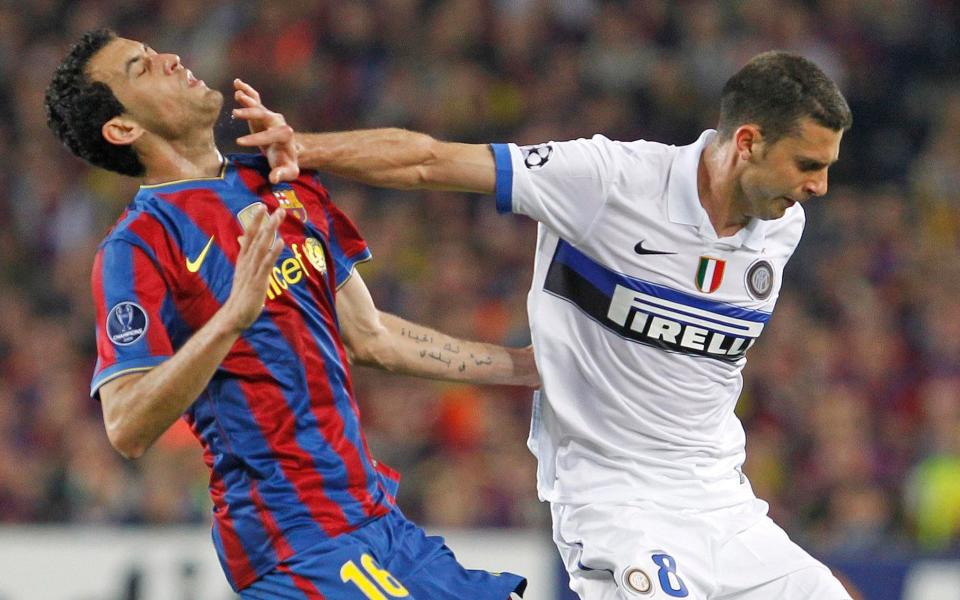The night Jose Mourino's Inter Milan left a scar on Pep Guardiola's soul

There was more than an hour still to play, Inter Milan had just been reduced to 10 men following Thiago Motta’s contentious dismissal and the Nou Camp smelt blood when a suited Pep Guardiola beckoned over Zlatan Ibrahimovic. Trailing 3-1 from the first leg in Milan, the game now threatened to open up for Barcelona and, for the first time in an enthralling Champions League semi-final, their fans could see a pathway to the final at, of all places, the Santiago Bernabeu, home of their fiercest rivals Real Madrid.
As Guardiola delivered instructions to Ibrahimovic, though, their touchline exchange was momentarily interrupted. Sidling up behind an unsuspecting Guardiola and resting a hand on his right shoulder, the coach of Inter Milan leaned in and whispered into the ear of his Barcelona counterpart, who did not turn around but did not need to either. “Don’t start the party yet,” Jose Mourinho warned. “This game isn’t over,” before patting a quietly insulted Guardiola on the back of the neck and walking off.
As a metaphor for that taut, tense April night in Catalonia, it felt apt. Wherever Barcelona looked, wherever they went, wherever they probed, there was someone from Inter shadowing them, lurking, just there: on their shoulder, in their back, in their face, blocking their way, digging in. Like a bad smell, Inter just hung around and hung around and not even the best team with the best player in the world, and a numerical advantage, could find a way of bypassing what would go down as one of the greatest rearguard actions in Champions League history. Mourinho had devised a three or four man gabbia - the Italian word for cage - to effectively “jail” Lionel Messi and to this day it remains one of the most successful Messi counter strategies witnessed.
Guardiola’s Manchester City may be the overwhelming favourites to overcome Inter in Istanbul on Saturday and clinch that elusive first European Cup crown, and with it an extraordinary Treble, but an all conquering Barcelona were also most people’s bet to beat the Italians in 2010.
Thirteen years on, Inter are a different side, there is no Mourinho and this is a one-off game, not a two-legged tie, but Guardiola is unlikely to have forgotten the day Internazionale of Milan administered one of his most painful Champions League experiences.
For all that conspired on the pitch, events off it felt no less significant in shaping an epic tie. If the Champions League has become something of a fixation for City’s Abu Dhabi owners, and an itch Guardiola is desperate to scratch, Barcelona’s desire to lift the European Cup in Madrid had become an “obsession”. The Barcelona players themselves were talking about a “once in the lifetime opportunity” and Mourinho - a master of the mind games - was only too happy to play to that theme and crank up the pressure to the point of it becoming an almost unbearable weight. “We want to follow a dream,” Mourinho said. “But it’s one thing to follow a dream and another to follow an obsession. For Barcelona, it’s an obsession … it’s an obsession you can see and feel. To have a Catalan flag in the Bernabeu is an obsession.”
Inter, by contrast, were fuelled by different, less abstract, more personal motivations: rejection and revenge. Wesley Sneijder, Walter Samuel and Esteban Cambiasso had all been dispensed with by Real and now had the opportunity to win the European Cup at the club that discarded them. It was the a similar feeling for Mourinho: overlooked for the Barcelona job in 2008 for Guardiola and now with the chance to stick it to his former employers against the man who took the job he craved in a game that would ultimately sever the last shred of a link with the club where he had spent several key, formative years. And then, finally, there was Samuel Eto’o, unceremoniously dispatched to Inter by Guardiola in the wake of Barcelona’s treble success the season before and desperate for some payback. So all had a point to prove. That Eto’o’s transfer to Inter had facilitated Ibrahimovic’s move to Barcelona merely upped the ante further given the Swede had resolved he was never going to win the Champions League with the Serie A club.
There were other factors, too. The eruption of the Eyjafjallajokull volcano in Iceland the previous month had created an ash cloud that led to the closure of European airspace and forced Barcelona to travel over 1,000km by bus to Milan. Ibrahimovic branded it a “disaster” but Barcelona’s defeat in the San Siro was down to a lot more than any fatigue they may have been feeling.
For all the accolades subsequently heaped on Mourinho for the defensive masterclass in the 1-0 defeat that would follow in the Nou Camp, it is easy to understand why the Portuguese tells anyone who is prepared to listen that he preferred the first leg. The second game may have fit neatly with the narrative of a clash of cultures - all out attack meets all out defence - but Mourinho did a number on Guardiola in Milan.
📆 OTD in 2010...
Those famous celebrations as Inter knocked Barcelona out of the Champions League at the Nou Camp 💀👀
Absolute peak José Mourinho 🤪pic.twitter.com/JGnCrDGtrG— Football on BT Sport (@btsportfootball) April 28, 2020
He knew that if Inter were to prevail in the tie, they had to win at home and so devised a strategy to exploit the spaces behind Barcelona’s full-backs, Dani Alves and Maxwell, the moment they recovered the ball. It would see Inter spring from the tightest of defensive low blocks to a high speed attacking transition involving three, four and even five players, including the right back “trigger” Maicon, who scored and excelled. There were so many details for his squad to digest that the game plan was presented over the course of two days and it was testament to the players’ belief in it that they did not stutter even when Barcelona took a 19th minute lead through Pedro. Inter would hit back through goals from Sneijder, Maicon and Diego Milito and left disappointed not to have scored more.
The success Inter had stifling Messi would also form the blueprint of the defensive operation launched in Barcelona when, in the words of their manager, they would “shed blood” and give him “the most beautiful defeat” of his career. After years spent studying Messi’s movements, Mourinho resolved that stopping the Argentine magician - who was playing off the right - would take a group effort predominantly involving Motta, Esteban Cambiasso and left back Javier Zanetti operating in carefully defined zones and constant communication where concentration had to be total. Motta’s red card in the 28th minute, then, was not part of the plan.
The Inter midfielder had swiped out at Sergio Busquets but the Barcelona player went to ground as if he had been punched in his face and the sight of him peeking through his fingers to check his opponent would be punished represented the worst of Barcelona’s dark arts. What followed was a show of extraordinary positional and mental strength from Inter: catenaccio, Mourinho style, with bells and whistles.


Whereas Inter had defended deep and broke at the right times in Milan, now there was no attempt to attack. Inter, Mourinho said, did not want the ball because he did not want his players being pulled out of possession when they lost it. Barcelona finally broke Inter’s resistance in the 84th minute when Gerard Pique scored but it was not enough.
At the final whistle, as Barcelona’s players sank to their knees, Mourinho bolted towards the Inter supporters in the Nou Camp heavens and began pointing - pointedly - to the sky. Think of his celebration at Old Trafford with Porto and then double it, triple it even. Barcelona, who had complained about the San Siro pitch not being watered, turned on the sprinklers as Inter celebrated but nothing was going to douse that particular fire. A month later, Mourinho - the man who had denied Barcelona their date with destiny in Madrid - was appointed Real manager. The battle ground with Guardiola, though, had already been drawn.

 Yahoo Sports
Yahoo Sports 